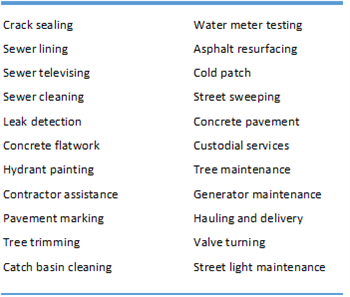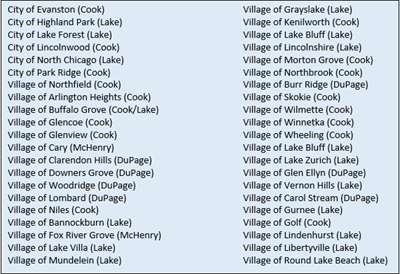
Chicago Metropolitan Agency for Planning
Municipalities throughout the region are working together to improve government efficiency.
 By Josh Ellis and MPC Research Assistant David Garza
By Josh Ellis and MPC Research Assistant David Garza - August 6, 2014
Across the country, governments are investing in efficiency. Motivated by budget crunches, scarce resources, service duplication and the desire to spur economic development, public officials are exploring consolidation, collaboration and other means to better serve their constituents. In this series, the Metropolitan Planning Council (MPC) will highlight efforts to improve government efficiency.
“No municipality is an island” is how a core group of local governments in Northeastern Illinois envision their role in the region. Over the last four years, the villages of Glenview, Northbrook, Highland Park, Lake Forest and a growing list of others have been at the forefront of a shared services and joint-bids procurement initiative that has garnered real cost savings and buy-in from other area municipalities in the region seeking to become more efficient in the procurement and service delivery process.
The Municipal Partnering Initiative, started in 2010, has leveraged geographic proximity and economies of scale to lower costs for municipalities purchasing services and commodities.
With 1,451 local governments, northern Illinois has the highest concentration of individual municipalities per square mile in the nation. To minimize redundancies in services and control costs, communities are learning to pool together resources, share services and collaborate on bids to meet their local needs.
Origins
The partnering initiative originated in 2010 when 18 municipalities in Lake and Cook counties began discussing creative approaches to municipal service delivery. In the midst of an economic downturn and a reduction in revenues, municipal managers agreed upon one simple idea: Working together as opposed to working independently in the procurement process could deliver savings that immediately impacted each municipality’s bottom line and each taxpayer’s bill, something worth exploring for communities with already stretched budgets and overburdened taxpayers.
The Municipal Partnering Initiative model
Municipalities are responsible for providing a range of basic services to their taxpaying citizens, including anything from waste and sanitation services to street repair and the maintenance of public infrastructure and facilities. Historically the model has been one of a local government, through a primarily in-house staff, providing a range of services paid for by a steady flow of tax revenue and user fees. In recent years, though, it has become apparent that just increasing property and sales taxes to create additional revenue is no longer a sustainable model for the future. Local governments have to change the way they are doing business and consider cost-efficient service provisions that don’t sacrifice quality. The services Municipal Partnering Initiative participants identified that could best be provided by private contractors are listed detailed at right.

Commonly identified services sent for private contractor bidding.
One of the recent adopters of the Municipal Partnering Initiative Model in 2013 has been the Village of Lombard. Carl Goldsmith, Public Works Director for the Village of Lombard, emphasized that the Municipal Partnering Initiative was more “a philosophy than an actual organizational template.” In order for the model to work, he emphasized, communities must “buy in to the philosophy.” This buy-in, he said, must extend to both elected and non-elected officials, such as the village manager, administrator and board.
How it Works
These commonly outsourced municipal services are selected and standardized for bid specification and committees of shared staff are formed to oversee responsibilities in specific areas. For example, the Public Works Committee, consisting of a joint municipal public works staff, coordinates project bids specific to public works. Similarly, a Construction Committee shares expertise and oversees project bids specific to construction. Having one standardized bid document is what makes this process work effectively.
Communities can decide to opt in or opt out of bids based upon their particular needs and any participating community can decide to take the “lead” on a project. “Taking the lead” means making sure that every participating communities’ bid specs are aligned and that the proper “to-standard” documentation is submitted. By sharing staff work time and applying bulk purchasing practices optimal costs can be established. In the bidding process, private contractors tend to competitively adjust prices based upon the expectation of securing multiple contracts. The greater the number of communities that participate in the bid, the more contractors see an incentive to offer the most competitive price. Once the joint bid comes back it is up to the individual municipality to carry out the contract with the vendor, oversee the project(s), and pay for the services delivered.
In 2011, 11 joint bids were pursued by Municipal Partnering Initiative communities in service areas as diverse as crack sealing, resurfacing, sewer lining, leak detection, hydrant painting, water meter testing and emergency contractor assistance.
Participation
By the end of 2013, more than 20 communities throughout the region with populations ranging from 2,500 to 75,000 were involved in bids for more than 20 services.
Smaller communities stand to gain the most from economies of scale. For instance, they might have less than 1,000 square feet of sidewalk to maintain, but with other communities they pay the lower contractor price per square foot for 20,000 square feet.
Cost Savings
Calculating cost savings estimates involves taking the unit costs of a Municipal Partnering Initiative joint bid project and comparing it to the costs of a non-Municipal Partnering Initiative project bid. Using this methodology, a June 2014 review attributes a total aggregate savings estimate of over $1.23 million from the Municipal Partnering Initiative model from 2011 to 2013. These raw savings estimates are based solely on unit costs and do not take into account the efficiencies gained by consolidating advertising and review processes.
In addition to direct savings, communities have also been able to achieve cost containment. The ability to stabilize a service with cost fluctuation like asphalt roadway resurfacing cannot be overstated. Asphalt, a petroleum based product, is subject to the price volatility of oil traded in the open market. High oil prices tend to raise the cost of all other petroleum based products including asphalt. For many communities who maintain their own roads trying to stabilize this cost is important for their budgets. Partnering on this service allows for greater opportunities for cost containment.

By 2014, 40 municipalities were participating in the MPI Model.
In 2011, Morton Grove, Wilmette, Glenview and Winnetka extended an existing joint contract for asphalt crack sealing to Buffalo Grove, Evanston, Glencoe, Highland Park, Lake Bluff, Lincolnshire, Skokie and Clarendon Hills. Cracking in asphalt pavement occurs when temperature and traffic fluctuations create strains that the pavement can no longer support creating cracks in the surface. Crack sealing is a necessary maintenance activity preventing further deterioration by mitigating the infiltration of water. The crack itself is sealed with a rubberized asphalt. Together, these 12 communities were able to renegotiate contractor pricing and save a combined total of between $50,000 and $70,000 when the new consolidated price was compared to the non-consolidated price of 2010.
Today the Municipal Partnering Initiative has extended its reach to 40 municipalities in over five counties with bids in more than 20 services. In December 2013, officials from DuPage County met with Glenview staff to discuss the formation of a DuPage Regional Group which would emulate the Glenview Municipal Partnering Initiative model as a best practice.
Suggestions for Shared Service Practice
Goldsmith, as the Village of Lombard public works director, has some unique insight into the village’s experiences with the Municipal Partnering Initiative. He notes that the coordination of contractor documentation was critical to his efforts. Having “good, standardized front-end bid documentation was very crucial,” he added. He sees this standardization process helping those small communities with fewer staff that are technically adept at bid documentation preparation.
Public engagement and education is an area he sees the Municipal Partnering Initiative model needing some improvement. “Too many communities have the perception of this being an exclusive club,” he said. Lombard has worked to make updates of joint bid projects available to the public through news releases as an example of how government can work.
In all, it looks like the Municipal Partnering Initiative model is a practice that is here to stay. If Goldsmith’s view is any indication, it’s a practice the Village of Lombard will continue to learn from and improve upon as it plans for future developments.
Municipal partnering is more than just a trend in better government. Not only does this have the potential to help taxpayers but it also gives local governments broader choice in allocating budgets. It is a new attitude toward delivering services that puts efficiency and taxpayer savings front and center.
Curious about other initiatives around the Chicago region and beyond? Take a look at the rest of the Taking Action series.